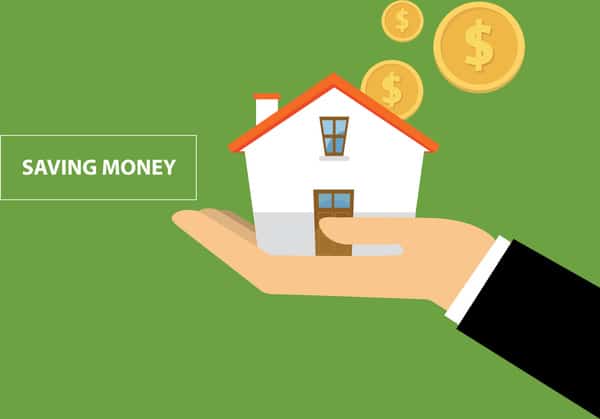Buying a home will likely be the largest purchase you make in your life. Most homebuyers will need a down payment anywhere between 3%-20% of the cost of the home to get approved for a mortgage.
In addition to saving money for your down payment, you’ll also need extra cash for emergencies, maintenance, repairs, and closing costs. To save enough money to buy a home you’ll need to decrease your spending and increase your income. Here are 10 ways to save money to buy a house.
 1. Track Your Spending and Create a Budget
1. Track Your Spending and Create a Budget
To understand how much money you could be saving, track everything you purchase over the past 3 months. Identify at least 2 or 3 categories you can reduce or eliminate your spending in like travel or discretionary fitness. Download a budgeting app to create reminders and hold yourself accountable.
2. Reduce Your Housing Costs
Housing is likely your largest monthly expense. While it will help to reduce spending in other areas, housing is usually the area of spending that can make the biggest impact.
- Downsize your apartment to a studio
- Move-in with roommates or partner
- Move-in with family
- Live in a lower cost area
- Ask your landlord to reduce your rent
- Offer to work for your landlord to receive a discount on your rent
- Consider being an on-site property manager for an apartment complex
- Rent out a spare room
- Convert your living room into an extra bedroom to rent out
It can be hard to live with family or share your space with roommates. However, cutting your rent in half or eliminating your housing costs can help you buy a home years sooner. If you are looking to save money to purchase a home quickly, see if your parents or other family members would let you stay for free.
3. Cancel Your Subscriptions
Once you’ve looked at your spending habits, separate all of the non-essential purchases and identify the recurring monthly purchases like streaming services, fitness memberships, and beauty treatments.
Cancel your subscriptions while you are trying to aggressively save. You can always sign back up once you’ve reached your savings goals and have more room in your budget.
4. Defer Investments and Saving for Retirement
This option might not be right for everyone, but if your priority is to buy a home soon, you might want to stop contributing to retirement funds and investments temporarily.
Consider how much you have saved or invested and how much time you will have to catch up after you’re ready to start contributing to investments to understand if this option is right for you.
5. Reduce Your Food Costs
Aside from housing, food is another category that you can likely cut back on.
- Stop eating out
- Pack meals to go
- Create a grocery budget and a shopping list before you go to the store
- Use coupons and savings apps
- Buy low-cost nutrient-dense foods like beans, oats, and leafy greens
- If you do eat out, go to happy hour
6. Ask for a Raise or Promotion
This is probably one of the easiest ways to increase your income. In many cases, your boss will give you a raise if you can make a case for it. Try to be paid more for the work you’re already doing before you take on more work.
Start a Business
Create a business you can run on the side of your full-time job. The benefit of owning your own business is you can retain a higher percentage of the profits and control your schedule and workload. There are endless types of businesses that cost nothing to start.
See our: Tips for First-Time Homebuyers
7. Get a Part-Time Job
If starting your own business feels like too much risk or too much responsibility, get a part-time job. Working a few nights and weekends can help you grow your savings faster. Search job boards for part-time, freelance, or contract work to take on temporarily.
Pro Tip: Find a part-time job that has downtime and allows you to work on other things. Some security or reception jobs will allow you to work on other things, like your own business, during your downtime on the clock.
8. Take Advantage of Free Money
Put your money to work and let it grow on its own by:
- Putting your regular purchases on a credit card with reward points. Pay off your balance in full every month and transfer the reward points into your savings account.
- Using a high-interest savings account through and online bank or credit union. Some accounts will offer up to 2% interest.
9. Ask for a Loan or Gift
Ask family or friends for a loan or a gift if you are comfortable. If a friend would like to give you a gift for a holiday or birthday, ask for the gift of cash for your future home.
10. Other Factors to Consider
Aside from saving money for a down payment and emergency fund you’ll need to consider some other financial factors as well.
Credit Score
You’ll need to meet a minimum credit score to be approved for a mortgage. How high your score is will also determine your interest rate. You can save a lot of money by keeping your interest rate low. You’ve worked so hard to save up your down payment and emergency fund and it would be a shame to neglect improving your credit score while you save.
Also, if you have a higher credit score, you can get approved for a lower down payment which will reduce the total amount you need to save.
Tips to Improve Your Credit Score
- Pay off high-interest loans first
- Consolidate debt or transfer debt to accounts with lower interest rates
- Keep your credit usage under 30% of your available credit
- Don’t apply for any new loans or credit cards when you are preparing to apply for a mortgage
- Make all minimum payments on time
- Consider the debt snowball or the debt avalanche method to pay down debt faster
- Keep lines of credit open as long as possible to establish credit history
The challenge of saving money for a down payment can be a major obstacle to overcome for homebuyers. To reach your savings goals as quickly as possible, you’ll need to increase your income and reduce your expenses. There are always changes you can make to save more money.
Don’t forget to check out How and Why To Refinance Your Mortgage







